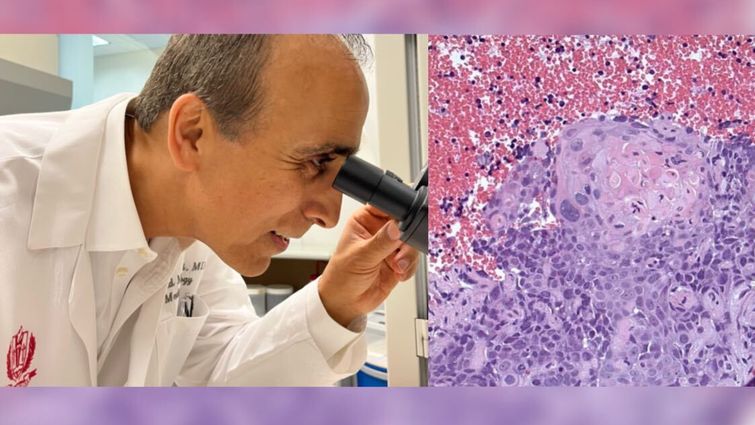

On the left, lung cancer expert Hamid Mirshahidi, MD, peers into a microscope; on the right is an image of what a type of lung cancer looks like on the microscopic level.
In the fight against the nation’s deadliest cancer, medical science wields a powerful ally: molecular markers. Identifying molecular markers involves unraveling the genetic and protein signatures unique to each patient's lung cancer, paving the way for tailored therapies and treatment strategies that best target the tumor.
Hamid Mirshahidi, MD, a medical oncologist at Loma Linda University Cancer Center, says World Lung Cancer Day presents a timely opportunity to explore how molecular markers are reshaping the landscape of lung cancer treatment and granting patients brighter futures.
Molecular markers, also known as biomarkers, are measurable characteristics in the molecular structure of a tumor that provide essential information about that tumor's origin, behavior, features, and response to treatment. Experts identify these markers by performing biopsies of the tumors and analyzing the samples through various laboratory tests, Mirshahidi says, including molecular profiling and genetic sequencing.
Read: Genetic testing offers patients speedy diagnoses, individualized cancer therapies
By identifying specific genetic alterations or protein expressions within a tumor, oncologists like Mirshahidi can select the most appropriate treatment options, optimize therapeutic responses, and monitor disease progression more effectively.
“We can take the information from the molecular markers we find and apply them to each individual’s lung cancer treatment,” Mirshahidi says. “This is precision medicine that allows us to address each patient's unique cancer profile and select the most effective treatment.”
Since the turn of the century, lung cancer care has pioneered the practice of testing for molecular markers, Mirshahidi says — the first being epidermal growth factor receptor (EGFR). Additionally, experts have designed targeted therapies that pertain to those specific genetic mutations, gene rearrangements, or protein abnormalities that drive the development and progression of the disease. Mirshahidi says targeted therapy for molecular markers significantly improves eligible patients’ survival outcomes while also causing fewer side effects and enabling a better quality of life.
Read: Great grandmother pushes stage IV lung cancer into remission with targeted therapy
Research has shown that patients with early-stage lung cancer who undergo surgery are twice as likely to survive when they receive targeted therapy for an EGFR mutation afterwards, as opposed to chemotherapy. Advanced stage lung cancer patients also experience a 50% improvement in survival when they receive targeted therapy for EGFR as opposed to chemotherapy.
Nowadays, Mirshahidi says experts can treat patients with various targeted therapies based on eight "actionable" molecular markers in lung cancer. Lung cancer experts have created more targeted therapies that address molecular markers in lung cancer than any other type of cancer.
"Lung cancer care continues to act as a leader in identifying molecular markers and creating targeted therapies," Mirshahidi says. "This variety of genetic mutations is uncommon with other types of solid cancers.”
Even when a patient's lung cancer's molecular markers are “non-actionable,” meaning no targeted therapy addresses that particular mutation, Mirshahidi says the molecular markers can still provide valuable insights for optimizing treatment approaches. For instance, a patient’s tumor’s molecular profile may reveal the cancer is most likely to respond well to immunotherapy instead of chemotherapy or radiation.
“Even without targeted therapy, molecular testing of a lung tumor can still help oncologists determine which treatment modality or combination of modalities — surgery, radiation therapy, chemotherapy, immunotherapy — the patient will best respond to,” he says.
Read: World Lung Cancer Day: Celebrating advances in care, patient resilience
Over the past two decades, the role of molecular markers in lung cancer treatment selection has grown even more refined and widespread, Mirshahidi says. Molecular testing, including genetic sequencing and other assays, is now routinely performed to identify specific markers in lung tumors. Discoveries and advancements are leading to the identification of additional markers and the development of novel targeted therapies.
“Targeted therapies and molecular markers are increasing patients’ chances of survival and cure rates,” Mirshahidi says. “The goal is to use these technologies and advancements to cure early-stage lung cancer and transform advanced-stage lung cancer into a chronic disease like diabetes or hypertension.”
Read: Stage IV lung cancer patient enjoys life extension from targeted therapy treatments
LLU Cancer Center participates in several clinical trials dedicated to testing molecular markers, targeted therapies, and various treatment strategies to save and prolong lung cancer patients’ lives. The Cancer Center is also part of a growing, country-wide network of cancer centers forming The Caris Precision Oncology Alliance, a leading cancer research enterprise focused on precision oncology such as molecular testing and targeted therapy.
At Loma Linda University Cancer Center, physicians are committed to providing patients with compassionate, comprehensive care that gives them the best opportunity to face and overcome cancer. To learn more about lung cancer care at the Cancer Center, please visit lluh.org/cancer-center/cancer-programs/lung-cancer-care.


